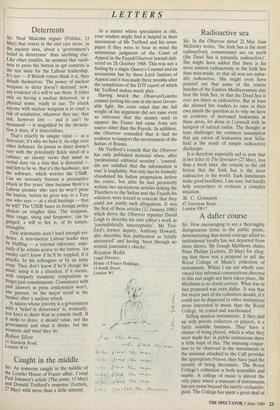LETTERS
Deterrents
Sir: Noel Malcolm argues (Politics, 13 May) that voters in the end care more, in the nuclear area, about a 'government's belief in deterrence' than anything else. Like other pundits, he assumes that readi- ness to press the button in apt contexts is the test issue for the Labour leadership. It's not — if British voters think it is, they delude themselves. The power of nuclear weapons to deter doesn't demand, now, any evidence of a will to use them. It relies only on having a nuclear deterrent, in a physical sense, ready to use. To attack anyone with nuclear weapons is to court a risk of retaliation, whatever they say; that risk, however low — and it can't be measured — is magnified by the devasta- tion it does, if it materialises.
That's exactly its unique value — as a deterrent; it's why we have it, its edge over other defences. Its power to deter doesn't vary with the potentially fickle mind of a cabinet; an enemy views that mind as verbal data via a lens that is distorted and felt to be so. But it's the hardware, not the software, which worries the USSR. Can we seriously foresee a preemptive attack in five years' time because there's a Labour premier who says he won't press the button, before he gives way to a Tory one who says — at a rival hustings — that he will? The USSR bases its foreign policy choices on tougher data. The weapons, their range, siting and firepower, can be gauged; a will to fire is, of its nature, intangible. Oral statements aren't hard enough evi- dence. A non-nuclear Labour leader may be bluffing — a rational inference, espe- cially if he retains access to the button. An enemy can't know if he'll be toppled, if it attacks, by his colleagues or by an army coup. They don't know if he'll change his mind, using it in a situation, if it occurs, with uniquely traumatic temptations to forget past commitments. Consistency with Past answers in press conferences won't, one guesses, be the major motif in the bunker after a nuclear attack.
A nation whose priority is a government with a 'belief in deterrence' is, ironically, less keen to deter than to console itself. If it seeks to deter, it should value, not the government and what it thinks, but the weapons and what they do.
Robert Silver
11 Stanwick Road, London W14


















































 Previous page
Previous page